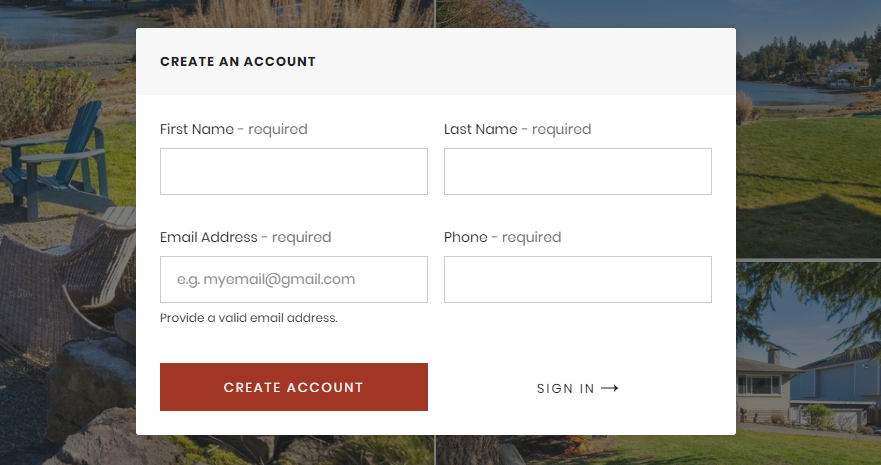What Is Forced Registration In Real Estate?
Forced registration in real estate refers to the practice of requiring visitors to a real estate website to provide their personal information, such as their name, email address, and phone number, before being able to access certain content or features on the site.
To be clear, this is totally non-optional registration—the user has to either fill out the form to view a listing or back out of the page.
The purpose of forced registration should also be obvious. For real estate websites, forced registration is a lead acquisition strategy. By requiring users to register, an agent can then follow up with a personalized marketing campaign, potentially turning that site visitor into a client. For example, Real Estate Webmasters' Smart List CRM feature allows grouping and searching leads based on their information and behaviour.
Below is an example of a typical lead registration form for a real estate website. Users are required to fill in this form before they can view any listings.

Forced Registration For Real Estate Leads: Yes or No?
Forced registration and registration settings in general are a contentious issue when it comes to real estate websites. Some agents swear by forced registration while others shudder at the mere mention of the words.
The purpose of this blog is to provide some evidence to show that forced registration works for getting real estate leads.
But before we get into that, let's look at the arguments for and against forced registration:
1. The argument against forced registration
The typical line of thinking for real estate agents is that forcing registration creates a negative experience for the site user. Agents fear their site will be considered "spammy" if they constantly ask users to fill out a form, negatively impacting both their real estate website's SEO and their personal brand or reputation.
In an ideal world, any potentially viable lead would voluntarily register or contact you directly. However, with forced registration, there's also the fear that you'll receive many fake names and phone numbers. Although the quantity may be there, the overall lead quality will suffer.
Overall, real estate agents tend to worry about these issues related to forced registration:
- A less user-friendly site experience, leading to...
- Higher bounce rate, which is worse for SEO
- A negative perception of your business or brand
- More low-quality or fake leads
All valid concerns, in theory...

2. The argument for forced registration
Of course, nobody wants to force registration, but there's a reason many sites use it: people won't register otherwise.
You've fought hard to get visitors to your site in the first place, so don't squander away the opportunity by not asking for the user's information. You will certainly receive the occasional fake name or phone number, but it's worth it to weed through the fake registrations because ultimately you'll still receive more business.
The argument for or against forced registration will come down to three questions:
- How does forced registration impact lead quantity?
- How does forced registration impact lead quality?
- How does forced registration impact the bottom line?
So let's find out!
Testing Forced Registration
JB Goodwin REALTORS® of JBGoodwin.com recently asked us to put forced registration to the test—by not forcing registration at all.
Real Estate Webmasters has been managing JB Goodwin's PPC campaign since 2016 and, while the client has been delighted with their lead generation so far, they wanted to experiment with different registration settings.
We haven't outright stated it in this blog post, but we at REW believe that forced registration is the only way to go. Time and time again, we've seen that clients who force registration see astronomically higher lead generation. If you've been part of our PPC program, you already know that forced registration is a default requirement.
But one of REW's core company pillars is innovation, so we're always willing to put our assumptions to the test through experimentation.
Previous Campaign Performance with Forced Registration
Here's a weekly look at JB Goodwin's campaign stats between January 1 and March 4, 2018, using forced registration:

As with any real estate PPC campaign, we see minor fluctuations in conversions (yellow) over this 9-week sample, but overall, the campaign was extremely steady, averaging approximately 1,042 visitors and 65 conversions (or leads) per week.
Turning Forced Registration Off
REW received a request to turn off JB Goodwin's forced registration for a two-week test trial. Forced registration was turned off on March 7. Here's a look at daily data from the first week of the test (without forced registration), compared to the week prior (with forced registration).
The dotted line represents forced registration and the solid line is without registration:

As you can see, conversions immediately dropped to less than one per day on average. The campaign continued to receive the same number of ad clicks, but people stopped registering. The site received 1,042 visitors and only 5 conversions (down from the previous average of 65).
When given the choice, people simply didn't take the extra step to provide their personal contact info.
That meant JB Goodwin Realtors was paying for people to visit the site without any mechanism of turning those visitors into future clients. In essence, they were advertising for people to come to their business, but once they arrived, they were giving away the product for free.
Because this had a real and immediate impact on the client's business, our experiment only lasted a week. When we turned forced registration back on, the conversion rate immediately skyrocketed up to its previous average:

What about non-PPC traffic?
While this was intended as a PPC experiment, only a portion of the site's traffic comes from PPC. But the story is nearly identical for organic and direct traffic as well.
From January 1st to March 6th, with forced registration on, the site had a 2.0% conversion rate for non-PPC traffic. From March 7th to March 13th, with forced registration off, the non-PPC traffic had a conversion rate of 0.4%.
Conclusion: Turn On Forced Registration
Lead Quantity
One thing is for sure: forced registration results in more leads. Looking at PPC alone, JB Goodwin's site averaged 65 leads per week with forced registration on, and 5 leads per week with forced registration disabled, or a conversion rate of 6.2% versus 0.5%.
In other words, forced registration led to 13 times as many leads generated through PPC. We repeat: Forced registration was associated with a 1200% increase in leads.
For non-PPC traffic, the site received 5 times the lead volume with forced registration turned on.
Business Results
What impact does forced registration ultimately have on business? With forced registration enabled, we expect agents to close between 1-3% of all online leads.
Let's return to our experiment. Through PPC, JB Goodwin REALTORS® received 5 leads in one week without forced registration and 65 leads per week on average with forced registration. That's an extra 60 leads per week. If JB Goodwin Realtors can close forced leads at a rate of 2%, that's an extra 1.2 closings per week generated by forced registration.

What type of improvement does that bring to their bottom line? In a perfect world where JB Goodwin REALTORS® are able to close all 5 unforced leads, an extra 1.2 leads per week results in a 24% improvement to their closings. If they are only able to close a more realistic 1 out of the 5 unforced leads, an extra 1.2 leads per week means a 120% improvement to their closings.
The numbers speak for themselves.
Unless your business is absolutely drowning in highly qualified leads, it simply isn't worth missing out on potential business from your online traffic.
In conclusion, our recommendation is to turn on forced registration.
What About Lead Quality?
Do we expect users who have been forced to register to be inherently low-quality leads? Not at all!
According to Inside Sales Agents, more than half of people who register online (on sites with forced registration) are planning to purchase a home within 3 months. It's hard to argue that people buying property in the short term are low-quality leads.
Finally, if a user was willing to register when registration was optional, they are, in theory, just as likely to register when forced registration is enabled. Therefore, the lead quality argument overlooks the fact that you're not losing any of your existing high-quality leads.
Getting The Most Out Of Forced Registration
Here are some best practices for getting more and better quality leads from forced registration:
-
Keep the form short and simple: Only ask for essential information on the registration form to minimize the friction of the registration process and make it easy for visitors to complete it.
-
Offer value in exchange for registration: Provide a clear value proposition that explains what visitors will receive in exchange for registering, such as exclusive content or access to special features.
-
Follow up promptly: Reach out to new leads as soon as possible after they register to maintain their interest and qualify them further. This can help you identify high-quality leads more quickly and improve your overall lead quality.
Forced Registration FAQ
Why do real estate websites use forced registration?
Real estate websites use forced registration as a lead generation tool to capture visitor information and build their database of potential clients. By requiring registration, real estate agents can track user preferences and property interests through the CRM, which can be used to tailor marketing campaigns and improve user experience.
What are the benefits of forced registration for real estate websites?
The benefits of forced registration for real estate websites include the ability to capture more leads and provide a personalized experience for users. It also allows real estate agents to follow up with potential clients more effectively and close more deals.
Are there any drawbacks to forced registration for real estate websites?
There are some drawbacks to forced registration. Visitors may be hesitant to provide personal information and leave the site before registering, leading to a higher bounce rate. It can also increase the number of low quality or fake leads.
How can real estate websites mitigate the negative effects of forced registration?
Real estate websites can offer incentives such as exclusive property listings, property alerts, or market reports in exchange for registration. Real estate websites should also ensure that the registration process is quick and easy, and that visitors can easily opt-out of any communication they receive.
How can real estate agents use the data collected through forced registration?
Real estate agents can use the data collected through forced registration to segment their audience and create targeted marketing campaigns. They can also improve their website and marketing efforts based on visitor interests and preferences.
